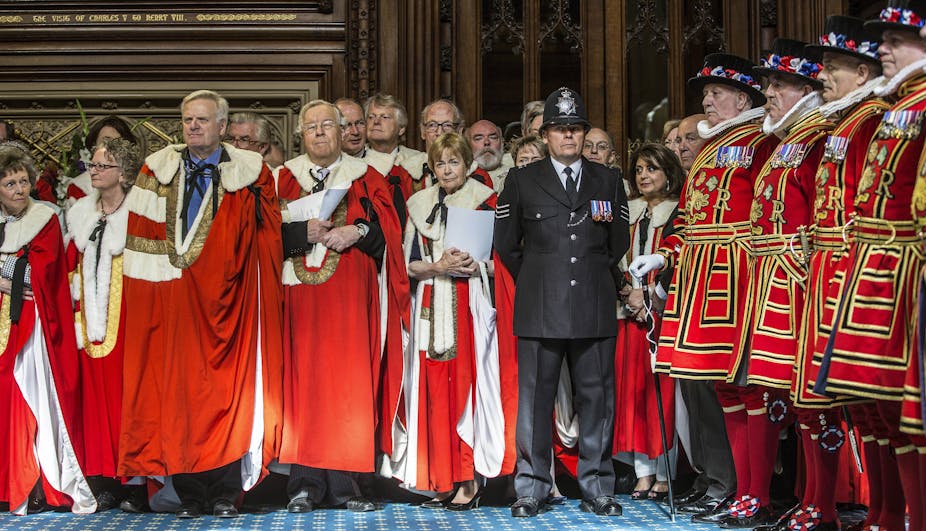After a week of anticipation and a tough three-hour debate, the House of Lords finally voted on the government’s controversial plans to cut tax credits for 3m households. Rumours abounded that a vote against the government would trigger a “constitutional crisis”, and Conservatives warned that the prime minister would simply pack the upper chamber with Conservative peers should the lords veto the plans.
In the end, the house defeated the government not once but twice, delaying the plans until the chancellor can find a way of compensating those affected by the cuts.
It’s not uncommon for governments to be defeated in the House of Lords, and this government is especially vulnerable there. Unlike the House of Commons, where David Cameron has a majority of MPs, the presence of more than 150 crossbench peers in the House of Lords means he has no working majority. He has already been defeated several times over the past few months.
But what makes this vote stand out is the big fuss the government has made about the potential constitutional implications of a defeat.
Hell to pay
For more than a century, the House of Lords has been restricted in voting on money bills, with the House of Commons having the final say on matters involving tax and spending. Conservatives argued that this should have stopped peers from vetoing the tax credit plans.
But the crucial difference was that this wasn’t a bill in the traditional sense, but a statutory instrument – a piece of secondary legislation which concerns itself more with the implementation, enforcement or amendment of government bills – and the hands-off-financial bills rule doesn’t apply.
Peers gently reminded the government of this at the start of the debate, pointing them in the direction of a select committee report from 2006 which went into the matter in some detail. It’s rare for the Lords to reject statutory instruments in this way (this incident was one of only a handful of occasions in living memory), but it is certainly not unconstitutional.
The government is unlikely to let matters rest. The veto means they will be unable to make the budget savings they needed this year, and the climb down announced by George Osborne last night was embarrassing. The defeat put the lords in direct conflict not just with the prime minister and chancellor, but with the House of Commons which had previously approved it.
Conservative MPs are already supporting their chancellor. Senior backbencher Edward Leigh demanded an urgent statement from the speaker on how the rights of the House of Commons can be preserved. The leader of the House of Commons, Chris Grayling, decried the lords’ behaviour as partisan and said it was time to “sort out” the relationship between the two houses – though he stopped short of saying how.
Winning them over
The debate about financial privilege and convention is important to those of us who care about the intricacies of the British constitution, but the showdown between the government and the lords may have an even more important effect. For once, the much-decried unelected upper chamber is making front page news for the right reasons.
Anyone who followed #TaxCreditsDebate on Twitter will have scrolled through plenty of the usual negative comments about peers, but what also came through was a feeling that those speaking in the House of Lords were genuinely concerned about the impact of the measures on society.
People were tweeting that the members of the house were actually more in touch with public opinion than their elected counterparts – and crucially, more so than the government.
Baroness Meacher, a former social worker and author of the successful crossbench motion, spoke of cancer patients, parents and carers who would simply be unable to make up the shortfall in their pay packets. The Bishop of Portsmouth described them as “morally indefensible”. Baroneess Manzoor spoke for many when she said that she wanted to be able to go home knowing that she had stopped a measure “which will have such a damaging and devastating impact on millions of people’s lives”.
So when ministers talk about unelected peers blocking the will of the elected House of Commons, we should remember that these same unelected peers were simply taking a stand against what they felt was the wrong decision. By doing so, they were fulfilling their house’s role as an important check on governments’ power.
Peers probably won’t welcome the rapid review to be announced by the prime minister. Packing the house with more Conservatives won’t go down well either, not least since the house already has more than 800 members.
But in the meantime, there can be no escaping the fact that the chancellor’s plans will now need to be watered down. Osborne has said we will have to wait until the end of November to find out more. Peers may ultimately lose the constitutional battle. But in the process, they may have won over the hearts and minds of the British public.
If the tax credits debacle triggers a long-overdue constitutional showdown on the future of the second chamber, this newfound support could prove crucial.

